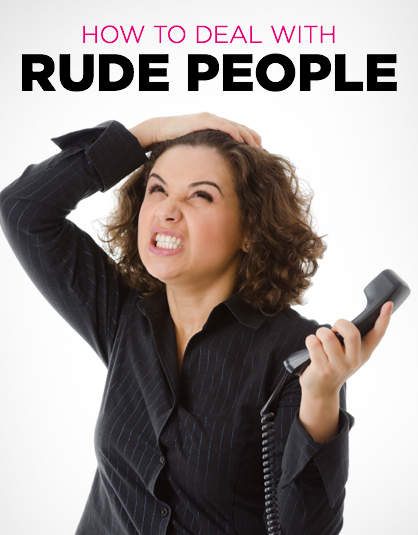The Best Way to Deal with Rude People
Don’t let bullies get to you
Everyone has come across a few rude people in the course of their day or work week. Rudeness is akin to bullying, and the same techniques that stop bullies in their tracks can help you deal with rude people.


Intimidation and power
Studies show that people who tend to bully others typically do so as a way to gain power and intimidate others, said Denise Limongello, psychotherapist.
“Maintaining a strong, unaffected attitude when dealing with a rude person can be a powerful defense against someone aiming to intimidate. Studies also indicate that good posture is associated with high self-confidence, whereas poor posture is associated with low self-esteem and chronic sadness. Standing tall, literally, can help give you the confidence to ward off a bully,” Limongello said.
It’s important to choose your battles. “When dealing with a rude person, specifically in the workplace, it is essential to evaluate whether or not the potential conflict that may result is worthwhile. Sometimes simply ignoring a rude person can be a better choice to creating an argument in the workplace. Weigh the options and see if it's worth your time to engage when someone is clearly giving you a hard time. For example, ask yourself if you think this person is going to hear you when you point out their rudeness. Perhaps your pointing it out will create tension in the office during daily interactions, such as meetings, so make sure you decide whether or not the possible discomforts that this interaction might yield are useful and necessary,” she said.
Never forget to go with your gut instinct. “Sometimes conflict is necessary when confronted with rudeness. People often report a ‘gut feeling’ when the need for assertiveness becomes apparent. Strong refusal to accept rudeness can be possible as long as respectful tone and language are used during the confrontation. Go for it if you believe you have a shot at stopping this rude behavior, for good. Be specific about the behavior you find offensive, and be clear that it is unacceptable,” she said.

Family vs. workplace
There will always be rude people we have to deal with. The important thing is not how they treat us, but instead how we respond to them, said Tiffany Komba, an author and blogger.
“If someone is being rude at work, then obviously you would handle it different than you would a friend or family member outside of work. In the work place, it is imperative that we always remain professional. But if a family member or friend is being rude, then by all means, address the issue. Address the issue at work as well, but do it in a professional and respectful manner. I think that we should always give someone the benefit of the doubt as to whether they're intentionally being rude. It is definitely easier said than done. But, by doing this, you are not giving that person any power over your mood or day.”
Giving people the benefit of the doubt is essential, agreed Jaime Pfeffer, a life coach, speaker and author of Uplift: The Giver's Guide to Wholeness, Love and Serenity, which comes out in August.
“You never know what someone has gone through that day. Rudeness or shortness are normally due to stress, fear or being taught to treat others that way. Practice compassion and empathy (putting yourself in someone else's shoes). One of the best ways I deal with rude people is by imagining them as a small child,” Pfeffer said.
“That said, if someone is repeatedly rude to you, you must be assertive because they have learned it is okay to treat you this way. Emotional abuse is never okay, though. Here are two ways to deal with a person who is repeatedly rude:
1. Say “Ouch. That hurts.” This is usually enough.
2. Walk away from the person and incident. Journal your feelings. 24-48 hours later, ask to set up a time to speak to the person. Do it in a neutral setting. Once there, express your feelings and state your boundaries. Use “I” language instead of “you” language so it is not blaming. For example:
“Becky, I've appreciated working with you over the past two years. I admire your level of detail and I've learned a lot from you. Something has been bothering me, though, and I need to communicate it to you. I experienced you getting angry with me last week when I said I didn't want to stay late to help you with your project. You said, “Fine!” and began slamming things around. I have experienced this behavior before when I've said no. I don't like this behavior. It feels uncomfortable for me and it feels unsafe. The next time it happens, I will walk away.”
Pfeffer said, “Once you’ve talked to someone, if the behavior continues, you need to detach yourself from it. That could mean spending less and less time with the person and eventually cutting them out of your life if the behavior doesn't stop. This applied to abusive family members, as well.”
Tagged in: career advice, bullies, rudeness,



